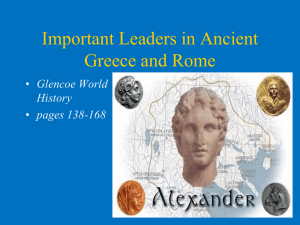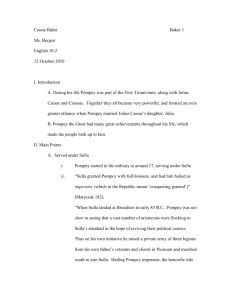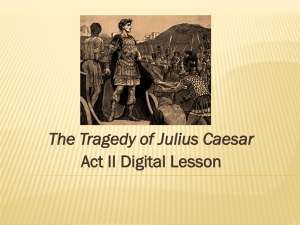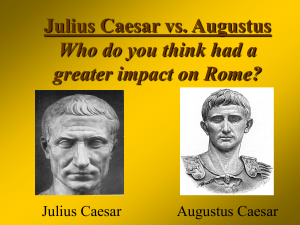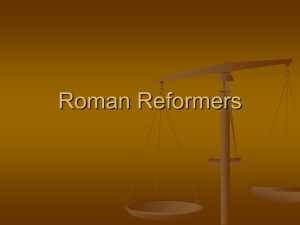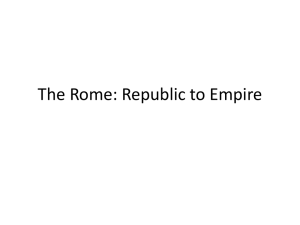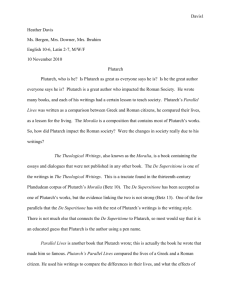his- Roman empire paper
advertisement
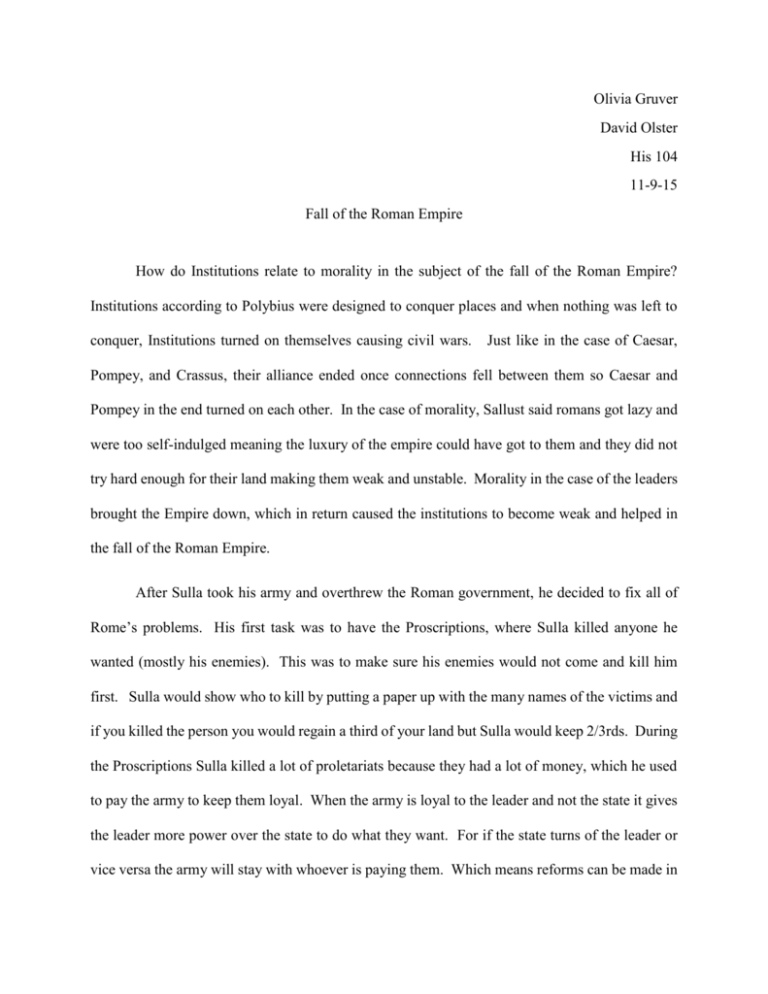
Olivia Gruver David Olster His 104 11-9-15 Fall of the Roman Empire How do Institutions relate to morality in the subject of the fall of the Roman Empire? Institutions according to Polybius were designed to conquer places and when nothing was left to conquer, Institutions turned on themselves causing civil wars. Just like in the case of Caesar, Pompey, and Crassus, their alliance ended once connections fell between them so Caesar and Pompey in the end turned on each other. In the case of morality, Sallust said romans got lazy and were too self-indulged meaning the luxury of the empire could have got to them and they did not try hard enough for their land making them weak and unstable. Morality in the case of the leaders brought the Empire down, which in return caused the institutions to become weak and helped in the fall of the Roman Empire. After Sulla took his army and overthrew the Roman government, he decided to fix all of Rome’s problems. His first task was to have the Proscriptions, where Sulla killed anyone he wanted (mostly his enemies). This was to make sure his enemies would not come and kill him first. Sulla would show who to kill by putting a paper up with the many names of the victims and if you killed the person you would regain a third of your land but Sulla would keep 2/3rds. During the Proscriptions Sulla killed a lot of proletariats because they had a lot of money, which he used to pay the army to keep them loyal. When the army is loyal to the leader and not the state it gives the leader more power over the state to do what they want. For if the state turns of the leader or vice versa the army will stay with whoever is paying them. Which means reforms can be made in the favor of the leader. While Sulla was in control he became one of the most hated rulers because he declared himself sol ruler and dictator for life. Plutarch said that “He behaved in such an arrogant and tyrannical way that he became more hated for his gifts than for his depredations” (Plutarch 106). Sulla had the ability to confiscate property, to found colonies, to found new cities or to demolish existing ones to take away or to bestow kingdoms at his pleasure, which he did raised up on a platform (Plutarch 106). The way Sulla presented himself and the way of government he used had not been used for 120 years (Plutarch 106) in Rome which is why many took offence because it was the last thing they wanted. While being Dictator, Sulla showed his true moral conduct for he did not abide by his own laws. During the time when he consecrated the tenth part of his entire property to Hercules, Sulla overly entertained people. He threw Banquets where much more food than needed was provided, everyday meat was thrown into the river and wines that were forty years and up were drunk. So much was provided that Caecilia Metella- Sullas wife- became mortally ill, Sulla was then banned from seeing her and to even have a funeral for her. However, “he spared no expense at her funeral, thus disobeying the law which he himself had introduced for the limitation of such expenditure” (Plutarch 108). However, before the funeral he sent divorce papers and ordered her to be moved from his house. Plutarch explains these things about Sulla to show how he was immoral, he focused on the luxury of banquets, food, and wine instead of his wife who eventually died from partying. Plutarch shows that if he is not moral enough to take care of his wife how can he be moral enough to take care of Rome. As military power increased in Rome it became more important for those wanting to have power to have a big loyal army. Pompey, Crassus, and Caesar had an alliance formed and received Maius Imperium meaning “superior Command” for five years. They divided the Roman World along with the Roman Army between them. InTres Partes: Caesar received Caul, Pompey received Italy and Spain, and Crassus received Syria and Asia. Along with the land each of the them received 1/3rd of the Roman Army however, this was dangerous because with three big armies and three powerful men it could lead to a civil war because as they grow stronger with their armies they will want more power and try to beat the others out for their power. The alliance was strong without fighting until the two connections holding it together fell apart. Crassus is killed by having molten gold poured down his throat, this connection being lost created a bigger chance of a civil war since the alliance now consisted of only Caesar and Pompey. However, the last connection of Julia, Caesars daughter and Pompey’s wife, dying pushed the fighting to start because nothing held the two together from that point. Along with connections being lost vanity and envy pushed the civil war between Caesar and Pompey. Pompey wanted Caesar replaced by a successor in his provincial command and asked for his troops that he lent Caesar during the war in Gaul. Caesar gave back the troops after giving them all 250 drachmas in the hopes they would stay loyal to him. However, when the troops reached Pompey they openly spread rumors about Caesar which were untrue, which then affected Pompey’s judgment and filled him with false hopes of defeating Caesar. Plutarch said that “It was Pompey, according to these officers, who was really the idol of Caesar’s army, and while Pompey, because of the festering disease of envy in Roman politics, was having some difficulty in controlling things in Rome, the army in Gaul was there, ready for him to use, and, if it once crossed over into Italy, would immediately come over to him, so unpopular had Caesar become because of his innumerable campaigns and so greatly was he suspected of planning to seize supreme power for himself. All this fed Pompey’s vanity.” (Plutarch 273). Plutarch was saying that Pompey had so much envy and vanity that it took over his judgment of the Caesar. With the lies he was told Plutarch made it seem that Pompey thought Caesar was weak and that he could beat Caesar with the army in Gaul. This moral conflict within Pompey of being envious helped in the push of starting the civil war because Pompey wanted power and by being told lies he felt he could take the power from Caesar easily. For two years the two prepared for war, Pompey allied with his enemy, the Senate, in the hopes of beating Caesar. However, to prevent the war for a little longer Caesar said to give him five more years as Consul however, Pompey does not allow this for he wants his power and decides to attack which starts the Civil War. Caesar in the end wins and takes control of the Empire however, he doesn’t kill his enemies which backfires because march 15th Caesar is killed at the bottom of Pompey’s grave. The alliance of these men could have worked if each did not want all the power, their moral state of mind of wanting the pleasure of power took over them which caused the fighting and destruction of the alliance and themselves. Not only was morality at fault but the institutional cause of the structure being designed to conquer places prevailed because as Pompey and Caesar were in power nothing was left to conquer and as Polybius said when institutions do not have places to conquer they turn on themselves and civil war can erupt. When a person gains power they normally make reforms to benefit themselves rather than the state. Augustus was a great politician who took pride in “restoring the Republic.” He was a traditional man that did not want to change anything however, he made reforms that changed everything about the republic. During his time in power Augustus gave himself many constitutional powers like Mais Imperium, which is the supreme command of all military power, every Roman general answered to him, which created a hierarchy. He also gave himself Tribunician power in which he could veto any law he did not like. Census power, right to say who was in or out of the senate, was another feature he gained. These rights Augustus gave himself pointed to him being a dictator because it showed him having all the power. Even though, in Augustus, Record of his Accomplishments he states that “the dictatorship was offered to me by both senate and people in my absence and when I was at Rome in the consulship of Marcus Marcellus and Lucius Arruntis, but I refused it” (Augustus 95). Augustus provided conflicting ideas when stating this because towards the public he was humble and quiet not showing the ways he was restoring the republic however; the public did not see his ways of manipulation. He would show the pubic one thing of not being a dictator and then make a reform like the Augustalis which made him as rich as the state, so he was economically necessary for Rome. Augustus made it so the state needed him however, the citizens did not know this was happening, he made it so the institutions benefited him without many people knowing. He was secretive and sneaky as a person which allowed him to have so many achievements and say that he restored the Republic. The Roman Empire fell due to moral causation because the many generals, politicians, and rich men that rose to power were power stuck, envious, and wanted luxury. They made it so reforms and laws benefited themselves more than the state, which eventually took a toll on the state and citizens because it is not just one person living there and if everything is about one person then the state will begin to fall due to the weakness of the leader’s morality. The institutions of the Roman Empire became weak because of the corruptness of the leaders. Their morality while in power brought down the state to a level where they could not regain strength throughout the years. In the case of the Roman Empire morality was the main cause of their fall because the corruptness of power within the leaders caused the institutions to be corrupt which then lead to the Empire failing.



